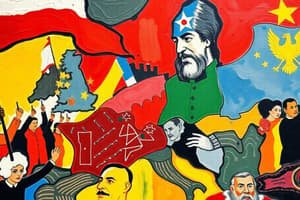Podcast
Questions and Answers
What impact did nationalism have on EU institutions during and after the Brexit referendum?
What impact did nationalism have on EU institutions during and after the Brexit referendum?
- Loss of trust in EU institutions (correct)
- Increased cooperation among EU member states
- Neutral impact on EU institutions
- Strong support for EU institutions
What has contributed to the rise of nationalist movements in European countries?
What has contributed to the rise of nationalist movements in European countries?
- Decrease in populism and nationalism
- Promotion of global cooperation
- Enhanced trust in EU institutions
- Economic injustice and feelings of resentment (correct)
Which significant events contributed to the rise of nationalism on the European continent?
Which significant events contributed to the rise of nationalism on the European continent?
- French Revolution and the Napoleonic Wars (correct)
- The Enlightenment era
- The Industrial Revolution
- The Renaissance period
Which European countries have experienced a rise in populist-nationalism, according to the text?
Which European countries have experienced a rise in populist-nationalism, according to the text?
What has been a consequence of the rise of nationalism in Europe?
What has been a consequence of the rise of nationalism in Europe?
What is essential for European countries as nationalist movements continue to gain traction?
What is essential for European countries as nationalist movements continue to gain traction?
What historical events stimulated the rise of nationalism in Europe?
What historical events stimulated the rise of nationalism in Europe?
How were some countries like Germany and Italy formed during the rise of nationalism?
How were some countries like Germany and Italy formed during the rise of nationalism?
Who is a prominent figure in the European nationalist scene, presenting himself as the defender of Hungary and Europe against Muslim migrants?
Who is a prominent figure in the European nationalist scene, presenting himself as the defender of Hungary and Europe against Muslim migrants?
Which political party has become the biggest opposition party in the Bundestag in Germany?
Which political party has become the biggest opposition party in the Bundestag in Germany?
What impact did nationalism have on European countries during its rise?
What impact did nationalism have on European countries during its rise?
What role did nationalist leaders and movements play in shaping the political landscape of Europe?
What role did nationalist leaders and movements play in shaping the political landscape of Europe?
Flashcards are hidden until you start studying
Study Notes
Nationalism in Europe: A Comprehensive Analysis
Nationalism in Europe has been a significant political force, shaping the continent's history and politics. This article will explore the rise of nationalism, the impact on European countries, and the conflicts and wars that have arisen from these movements.
Rise of Nationalism in Europe
The rise of nationalism in Europe was stimulated by the French Revolution and the Napoleonic Wars. Nationalism called on people to transform Europe in a few short decades, replacing rule by monarchies and foreign control of territory with self-determination and newly formed nations. Some countries, such as Germany and Italy, were formed by uniting various regional states with a common "national" identity.
Nationalist Leaders and Movements
Nationalist leaders and movements have played a crucial role in shaping the political landscape of Europe. For example, Hungary's Prime Minister Viktor Orban has been a key figure in Europe's nationalist scene, presenting himself as the defender of Hungary and Europe against Muslim migrants. In Italy, Matteo Salvini, leader of the League, is a prominent figure in the European nationalist scene. Additionally, the AfD in Germany has become the biggest opposition party in the Bundestag, with similar trends observed in other European countries.
Impact on European Countries
Nationalism has had significant impacts on European countries, including:
- A loss of trust in EU institutions during and after the Brexit referendum.
- The rise of populism and nationalism, with some strains being more inclusive than others, often based on political principles and respect for institutions.
- Economic injustice and feelings of resentment, which have contributed to the rise of nationalist movements.
Conflicts and Wars
Nationalism has also led to conflicts and wars in Europe. For instance, the French Revolution and the Napoleonic Wars were significant events that contributed to the rise of nationalism on the continent. Additionally, the European Union has faced challenges due to nationalist sentiment, with some countries, such as Hungary, Poland, Slovakia, and Croatia, experiencing a rise in populist-nationalism.
Conclusion
The rise of nationalism in Europe has led to significant political and social changes, impacting the continent's history and its relations with global institutions like the European Union. As nationalist movements continue to gain traction, it is essential for European countries to address the underlying issues that drive these movements and work towards fostering unity and cooperation among nations.
Studying That Suits You
Use AI to generate personalized quizzes and flashcards to suit your learning preferences.




